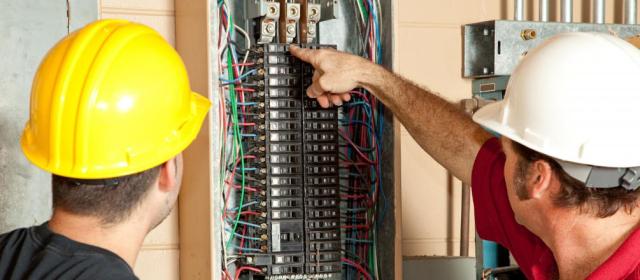Circuit Breaker Maintenance
Ensuring the safe and efficient operation of your electrical system hinges on diligent circuit breaker maintenance. Regular upkeep of these crucial components helps prevent electrical failures, protects equipment, and ensures the safety of your property, residents, and personnel. The below explains the importance of circuit breaker maintenance and offers valuable insights on developing a robust maintenance program for a safer building.
Please click here for an informative article on the function and maintenance of circuit breakers (switchgears).
Why Circuit Breaker Maintenance is Important
Ensuring Safe Operation of Electrical Systems:
Maintaining circuit breakers is vital for the safe operation of electrical systems. Designed to shield electrical circuits from overloads, short circuits, and faults, circuit breakers require regular maintenance to identify and rectify any issues or malfunctions. Addressing these problems promptly prevents serious damage and mitigates safety risks.
Preventing Electrical Fires and Accidents:
Proper breaker maintenance significantly reduces the risk of electrical fires and accidents. Faulty or malfunctioning circuit breakers can cause overheating, arcing, or electrical sparks, potentially igniting flammable materials and causing devastating fires. Regular inspections and circuit breaker testing detect potential hazards early, ensuring circuit breakers function correctly and preventing dangerous situations.
Extending the Lifespan of Circuit Breakers:
Routine maintenance helps extend the lifespan of circuit breakers, preventing premature failures. Over time, circuit breakers may wear out or sustain damage due to frequent use or environmental factors. Regular activities such as cleaning, lubrication, and circuit breaker testing can identify wear and tear early, facilitating timely repairs or replacements. This practice saves on replacement costs and minimizes downtime from unexpected failures.
Frequency of Circuit Breaker Maintenance
Proper maintenance is essential for the reliable and efficient performance of circuit breakers. Determining appropriate maintenance intervals, understanding factors affecting maintenance frequency, and following recommended schedules are key to extending circuit breaker lifespan and minimizing failure risks.
1. Determining Appropriate Maintenance Intervals:
The frequency of circuit breaker maintenance depends on several factors, including the type of breaker, its usage, and operating environment. Generally, routine maintenance is recommended at least once a year or as specified by the manufacturer. Critical applications or harsh conditions may necessitate more frequent maintenance.
2. Factors Affecting Maintenance Frequency:
Several factors influence the frequency of circuit breaker maintenance:
- Load conditions: Breakers handling heavy loads or frequent switching may require more frequent maintenance.
- Operating environment: Dust, humidity, temperature extremes, and corrosive atmospheres can impact performance, necessitating more frequent upkeep.
- Past performance: Breakers with a history of issues may need more frequent maintenance to address potential problems.
3. Recommended Maintenance Schedules:
Adhering to manufacturer-recommended maintenance schedules is crucial for proper circuit breaker function. These schedules typically include tasks such as cleaning, lubrication, inspecting contacts, testing, and calibration. Consistently following these schedules and maintaining comprehensive records of maintenance activities is vital for future reference.
By following appropriate intervals, considering factors affecting frequency, and adhering to recommended schedules, you can enhance the reliability and longevity of your circuit breakers, minimizing downtime and ensuring electrical system safety.
What Maintenance Includes
Proper maintenance is crucial for ensuring the longevity and optimal performance of circuit breakers. This section outlines key aspects of circuit breaker maintenance, including cleaning and inspection, circuit breaker testing, and circuit breaker repair or replacement.
1. Cleaning and Inspection of Circuit Breakers:
Regular cleaning and inspection remove dirt, dust, or debris that may accumulate on circuit breakers, preventing potential issues from blockages or obstructions. Inspections should check for signs of wear, corrosion, or loose connections, addressing abnormalities promptly to prevent further damage.
2. Testing for Proper Functioning:
Circuit breakers need periodic testing to ensure proper operation. This involves verifying their ability to interrupt electrical current when necessary. Various tests, such as trip time testing and current injection testing, assess breaker performance, identifying potential malfunctions early.
3. Repairing or Replacing Faulty Components:
If inspection or testing reveals faulty or damaged components, prompt circuit breaker repair or replacement is essential. This may involve replacing worn-out contacts, springs, or other parts with genuine manufacturer-approved components to maintain circuit breaker integrity and safety.
Circuit Breaker Maintenance for a Safer Facility
Regular circuit breaker maintenance is essential for ensuring building safety. Circuit breakers protect electrical systems from overloads and short circuits, but their effectiveness diminishes over time without proper maintenance.
Identifying potential hazards and risks is a primary reason for maintenance. Routine inspections by trained professionals detect signs of wear, loose connections, and other issues that could lead to malfunctions or electrical fires. Addressing these problems early prevents costly damages and ensures equipment, resident, and property safety.
Implementing safety measures during maintenance is also crucial. Follow proper safety protocols to minimize accident risks, including wearing appropriate personal protective equipment (PPE), de-energizing circuits before maintenance, and using insulated tools. Regular maintenance also includes testing circuit breaker functionality to ensure proper operation.
Submitting a Circuit Breaker Malfunction Insurance Claim to GNY
At GNY, we understand the importance of circuit breaker maintenance for a safe property. In the event of a circuit breaker mishap, submit a claim to our experienced team here.
This material is informational only. It is not intended to be, and is not in fact, a statement, in whole or in part, of GNY’s underwriting guidelines. Nothing said here amends or affects the interpretation, application, or both, of the coverage provisions in any GNY insurance policy; nor do the statements made here constitute a representation that insurance coverage exists for any loss under any GNY policy. Coverage depends on facts and circumstances of each individual claim or loss, the applicable laws, and the policy provisions in the GNY insurance policy.
